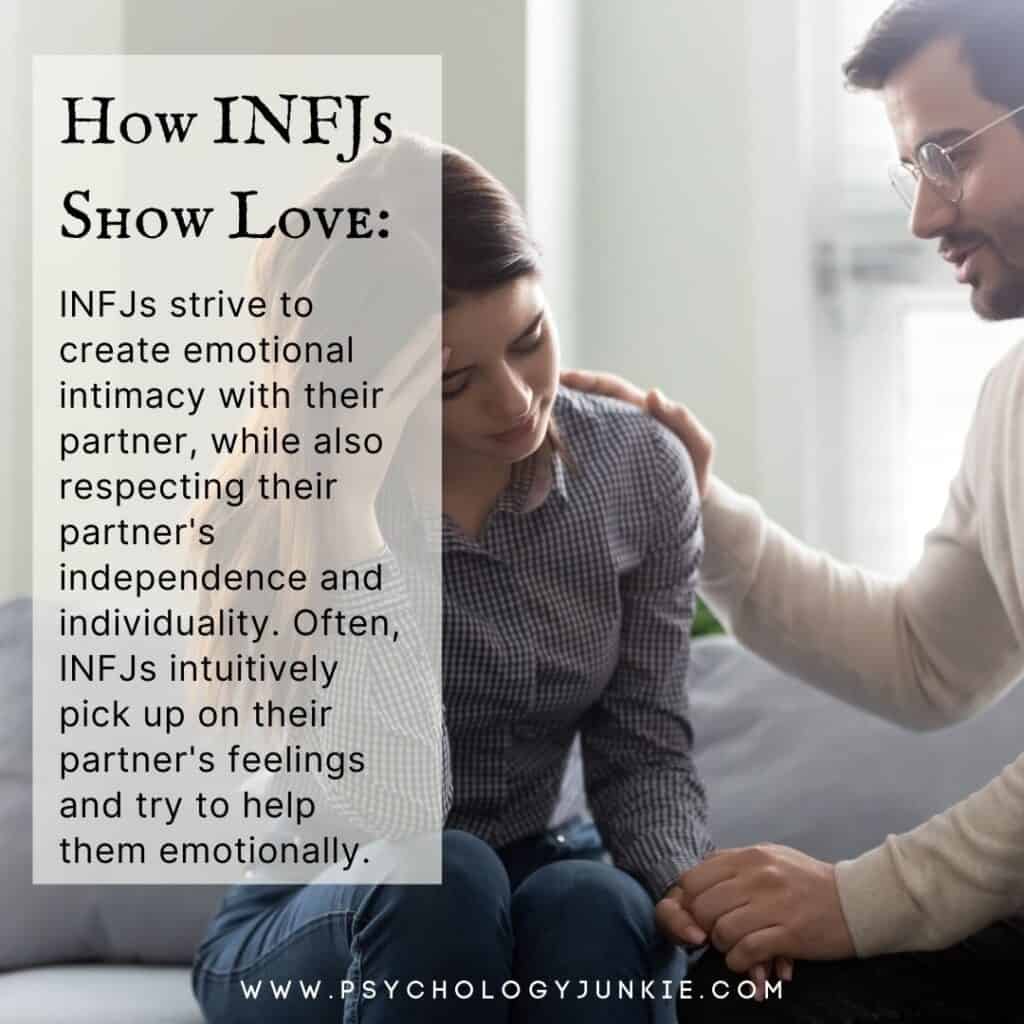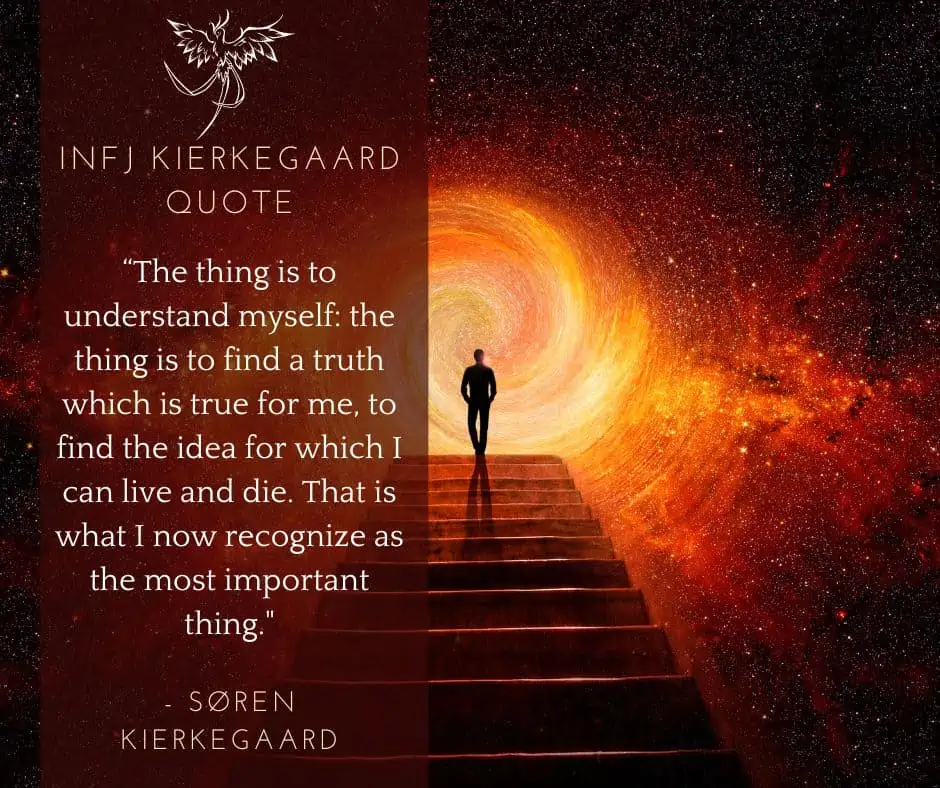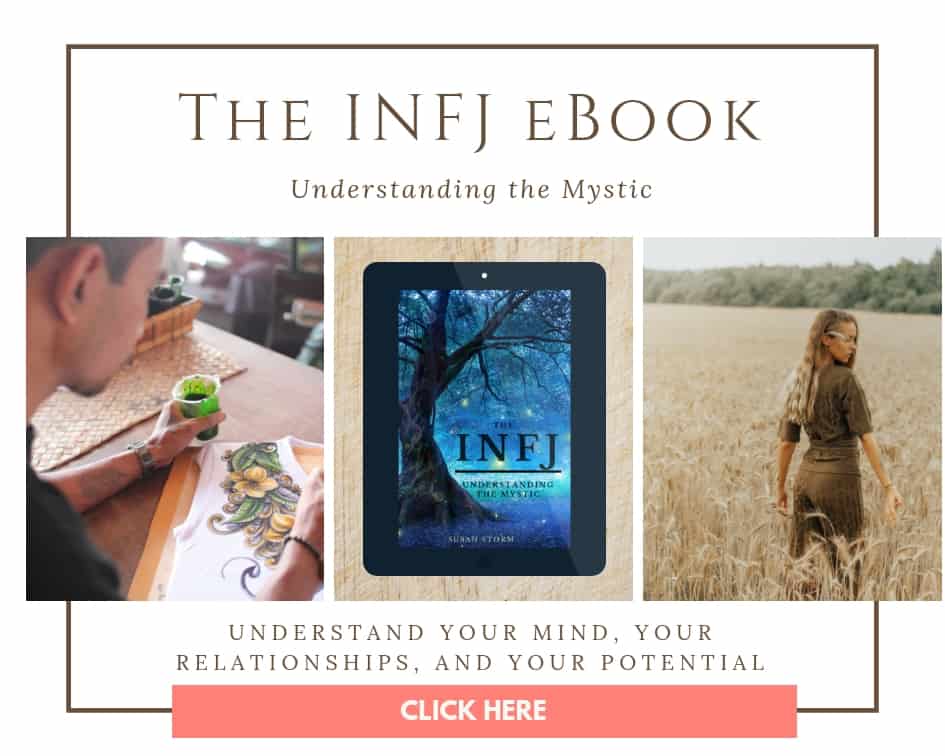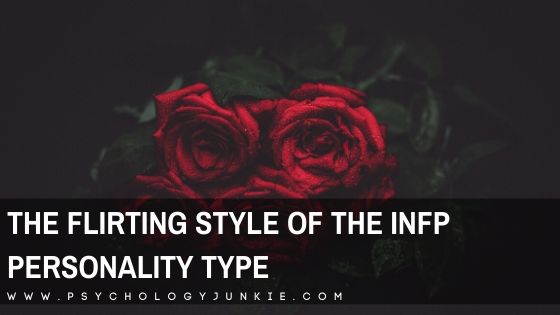How INFJs Say “I Love You”
Have you ever wondered how INFJs show they truly care? Whether you’re married to an INFJ or dating one, these complex types can be a mystery to certain individuals. In this article we’re going to explore the diverse and nuanced ways that INFJs show their love to others. Because if you’re a very different type (say, an ESTJ) you might find yourself scratching your head at the ways they express their love that are different from your own.
We’ll also take a look at some of the ways INFJs are misunderstood in relationships. All types, no matter how rare or common, struggle with being misread or misinterpreted by others. INFJs are no different. So if you’re in a relationship with an INFJ, it’s important to be aware of these potential pitfalls so you can avoid them.

Not sure what your personality type is? Try out our most highly recommended personality questionnaires:
- You can take our free personality questionnaire here
- You can take Personality Hacker’s highly accurate personality questionnaire.
- You can take the official Myers-Briggs Type Indicator® for $49.95
This article contains an affiliate link to a questionnaire on Personality Hacker. If you purchase one of their courses, I get a small kickback that I can use to pay for hosting and other demands of this site. I only recommend courses I love.
How INFJs Show Love

They Encourage You and Notice Your Positive Strengths
When INFJs care about someone they try to shine a light on that person’s hidden strengths or even obvious positive qualities. It’s important for them to make someone they love feel appreciated, uplifted, and inspired to embrace what makes them unique. INFJs might do this in a one-on-one conversation, in writing, or even just through the “vibe” they give off.
They Create a Warm and Loving Atmosphere
INFJs strive to create a warm and accepting connection with a person they love. They can do this in many ways; by playing “question games” where you learn about each other, by admitting their own vulnerabilities when you feel vulnerable, by cooking you dinner, calmly listening to your struggles with a reassuring demeanor, or by giving you a warm hug. INFJs often have a “calming presence” and work hard to create an atmosphere of openness and empathy. They want to make sure you feel relaxed and cared for when you are around them.
They See Your Potential and Point it Out
INFJs strive to see a spark of potential in every person they meet. When they see that spark of potential, they aim to catalyze it and encourage you to bring it out. Maybe you care about animal rights and they point out how you both could make a real difference in the world by contributing together for a non-profit. Maybe they see your love of music and encourage you to record your songs.
They Share Their Spiritual Side with You
Not all INFJs are religious, but most have a spiritual side to themselves. Whether this means they are drawn to meditation, prayers, or simply spending time in nature – INFJs often feel a profound connection to something “larger” than themselves. When they love someone they want to share this side of themselves with that person. However, it can take time before they feel comfortable inviting you into this spiritual space. They need to know that they can trust you and that you will be respectful of their beliefs and not belittle or dismiss then.
They Check In with You
When you’re on an INFJ’s mind, they’ll check on you to see how you’re feeling emotionally and whether you’re in need of any assistance. This could be as simple asking you whether you made it safely home after a drive or showing up after a breakup with some of your favorite comfort foods and a movie for you to watch. INFJs want to make sure you know they are there for you when you need them.
They’re Careful About What They Say
INFJs are very careful to never say anything they can’t take back, especially in their close relationships. If they love you they may sometimes seem like they’re in a long analytical space before they respond to your questions. If they need time to respond to you, to think through what you’re saying, to dwell in the silence, just know that’s because they care about how they’re impacting you and that they’re being honest and kind (yet truthful) with their words.
They Keep Symbolic Reminders of You
When an INFJ loves you, they’ll keep things that have personal significance and remind them of you. Movie ticket stubs, postcards, a pressed flower, items with personal meaning – INFJs are sentimental at heart and often enjoy keeping treasured items that remind them of your relationship and shared experiences.
They’ll Get to Know You Deeply
INFJs care less about the superficial things that others see and more about the deeper qualities that make you unique. They want to know what motivates you, what your deepest fears are, and what makes you feel most alive. INFJs want to understand you on a soul level and will always be interested in learning more when they love you.
They Will Emotionally Tune Into You
INFJs often identify with the term “empath” and it’s not surprising given their ability to deeply tune into the essence and aura of someone and feel their emotions. When INFJs love you they will tune into your emotions and will often know when something is wrong, even if you don’t tell them. Many INFJs report that they can sense when total strangers are not doing well emotionally, so when they love someone, they’ll hone in on those feelings even more in an effort to meet your emotional needs.
Common Hardships of INFJs in Relationships:
INFJs are an unusual breed in that they both crave emotional intimacy and crave independence. As introverted intuitives, they need the solace of quiet in order to let their intuition expand and process ideas and insights. At the same time, they crave emotional oneness with their significant other and often struggle to say “no” when their partner needs something from them. This can be overwhelming to an INFJ and confusing to a partner who always expects them to be “on”.
INFJs have to be especially careful not to lose themselves in relationships. It’s natural for them to be givers, listeners, and empaths. But if they’re not careful, they can forget to nurture their own needs and wants. Or they can become over-burdened with their partner’s emotions, especially if they are emotionally turbulent or volatile. INFJs need to make sure to give themselves space to tap into who they are on a fundamental level, what matters to them, and what their intuition is telling them.
If you’re an INFJ and you’re reading this, make sure that you’re taking time every day to revel in isolation. Meditate, listen to music, read, rest. Find ways to energize yourself and take care of who you are. It only will hurt your relationship if you lose yourself in it Your partner fell in love with you for you and part of what makes you you is being an introvert who gets their best insights in peace and quiet.
INFJs and Emotional Connection
INFJs crave emotional intimacy and warmth with their partner. They enjoy knowing what their partner likes, dislikes, loves, and hates. Reaching an emotional equilibrium and being able to sense each other’s feelings is something that revives them. However, if an INFJ is in a relationship with a Thinking type (or even, at times, IFP types) they may find themselves in the dark at times. They want authenticity and openness in a relationship, and if a partner is less in tune with their emotions, INFJs can feel like they’re grasping in the dark for clues about who their partner is or how they feel.
One of the INFJs’ goals in a relationship is to create an emotional oasis for their partner. They want to be someone that their partner can come to and feel safe, seen, and understood. When a partner doesn’t share their feelings or needs, INFJs can feel like they’re being left out in the cold.
They may wonder if their partner feels indifferent, or even worse, if their partner is hiding something from them.
If you’re an INFJ and you’re reading this, I want to encourage you to remember some personality differences. As an INFJ you need to be able to “talk out” your feelings, but some types are less confident in their ability to do this.
Thinking-Judging types, for example, tend to struggle with externalizing their emotions. They’re more likely to show their affection through acts of service or verbalize their thoughts and plans.
Thinking-Perceiving types (TPs) tend to feel more vulnerable and insecure sharing their feelings, because their Feeling function is just not as mature as it would typically be for an INFJ.
Feeling-Perceiving types (FPs) process their emotions in a more internal way. They need time to mull over their feelings before they’re ready to talk them out.
Yes, sometimes when a partner is more quiet about their feelings, it’s a warning sign. But for many people, it’s simply because they’re just wired differently. Give them some time and space, and be patient with their process. They may not understand why you need to “talk things out”, but that doesn’t mean they don’t care about you.
Finding Intellectual Stimulation

As dominant introverted intuitives, INFJs crave intellectual conversation and depth. They are curious about the meaning behind things, abstract themes, and distant possibilities. However, because introverted intuitives are so rare, they often struggle to find friends or partners who can match their interest in the abstract.
INFJs often find themselves feeling bored in relationships where their partner is not interested in exploring deeper ideas and meanings. INFJs want to be able to talk about the big questions in life and discuss their latest insights. If their partner is not interested in these things, INFJs can feel like they’re being stifled, uninspired, or intuitively suffocated.
INFJs need to find a balance between their craving for intellectual stimulation and their partner’s needs. There should be some give and take on both sides of the relationship.
If your partner is a Sensing-Perceiving type, try talking about abstract ideas and insights while doing something physical like taking a walk, going for a drive, or even taking a shower!
If your partner is a Feeling-Perceiving type, remember that tying the insight or abstract idea to something personal will be more interesting for them. How does your idea impact them? How does it impact you? Ultimately, why does it matter personally? Feeling-Perceivers are always interested in what matters personally to themselves and others as individuals.
If your partner is an Sensor, think about any practical implications of your insight or idea. Try to be as linear as you can (if possible).
Ultimately, if your partner loves you, they need to be able to meet you where you’re at at times. At the same time, you need to be able to meet them where they’re at. So mix it up – take turns every night talking about things you each respectively are fascinated in. Make that a safe and open space to speak (or for your partner to speak) without any fear of judgment.
On top of that, make sure to invest in friendships with intuitive types! These are the people who will enjoy venturing to that abstract space and can provide that for you outside of your relationship. INFJs need their “people” in order to feel fully understood, fulfilled, and supported.
What Are Your Thoughts?
Every INFJ is a completely unique person. Life experience, Enneagram type, attachment style, and so many other things impact how an INFJ will present themselves to the world. No two INFJs are exactly the same, but I do hope this article has helped you understand this type better!
Do you have any insights or stories you’d like to share? Let us and other readers know in the comments! Find out more about your personality type in our eBooks, Discovering You: Unlocking the Power of Personality Type, The INFJ – Understanding the Mystic, The INTJ – Understanding the Strategist, and The INFP – Understanding the Dreamer. You can also connect with me via Facebook, Instagram, or Twitter!

This article contains affiliate links to books on Amazon or courses on Personality Hacker. If you purchase one of these books or courses, I get a small kickback that I can use to pay for hosting and other demands of this site. I only recommend books and courses I love and have personally used.
Other Articles You Might Enjoy:
24 Signs You’re an INFJ, the Mystic Personality Type
4 Reasons You Might Be Lonely as an INFJ
INFJs and Their Romantic Compatibility with Every Personality Type
10 Things INFJs Look for in a Relationship

Subscribe to Our Newsletter

Want to discover more about personality type? Get the inside scoop with Susan Storm on all things typological, along with special subscriber freebies, and discounts on new eBooks and courses! Join our newsletter today!












Wow it always amazes me how spot on you are! I had tears in my eyes through much of this article. It just feels so comforting and I guess validating to hear the depths of my soul put into words. I feel very seen and understood when I read your work! Thank you!
While I really enjoy reading your work and most of it really resonates, I have a hard time with some of it too. What seems to be missing for me is the part that addresses the unhealthy version of each personality type – wether it’s the enneagram or the Myers Briggs. People present very differently when they are in an unhealthy place. So when I read these, I think, “so-and-so isn’t anything like that…?”.. Then I remember that these are describing best case scenario healthy versions of people. And let’s face it, most of us aren’t always our best selves.
Thank you for your wonderful work, I do look forward to your emails!